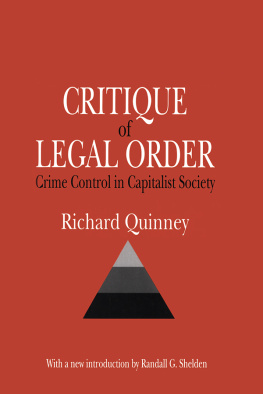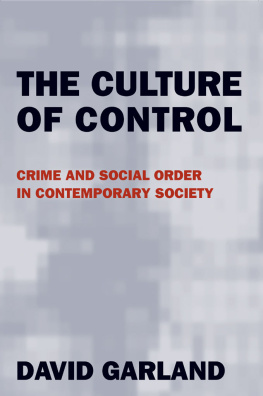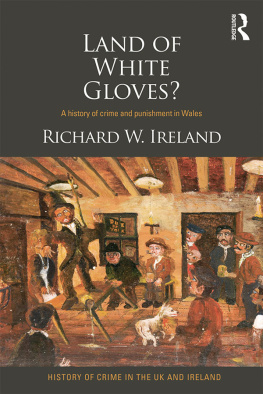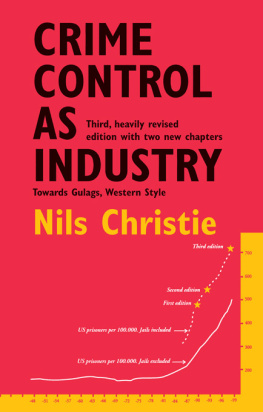Law & Society Series
Ancient Law
Henry Sumner Maine
with an introduction by Dante J. Scala
An Introduction to the Sociology of Law
Nicholas S. Timascheff
with an introduction by Trevio
Critique of the Legal Order
Richard Quinney
with an introduction by Randall G. Shelder
Fundamental Principles of the Sociology of Law
Eugen Ehrlich
with a new introduction by Klaus A. Ziegert
Penal Philosophy
Gabriel Tarde
with a new introduction by Piers Beirne
Sociology of Law
Georges Gurvitch
with a new introduction by Alan Hunt
The General Theory of Law and Marxism
Evgeny Bronislavovich Pashukanis
with a new introduction by Dragan Milovanovic
The Social Reality of Crime
Richard Quinney
with a new introduction by A. Javier Trevino
Originally published in 1974 by Little, Brown and Company.
Published 2002 by Transaction Publishers
Published 2017 by Routledge
2 Park Square, Milton Park, Abingdon, Oxon 0X14 4RN
711 Third Avenue, New York, NY 10017
Routledge is an imprint of the Taylor and Francis Group, an informa business
New material this edition copyright 2002 by Taylor & Francis.
All rights reserved. No part of this book may be reprinted or reproduced or utilised in any form or by any electronic, mechanical, or other means, now known or hereafter invented, including photocopying and recording, or in any information storage or retrieval system, without permission in writing from the publishers.
Notice:
Product or corporate names may be trademarks or registered trademarks, and are used only for identification and explanation without intent to infringe.
Library of Congress Catalog Number: 2001034716
Library of Congress Cataloging-in-Publication Data
Quinney, Richard.
Critique of legal order : crime control in capitalist society / Richard
Quinney ; with a new introduction by Randall G. Shelden.
p. cm.
Originally published: Boston : Little, Brown, cl974.
Includes bibliographical references and index.
ISBN 0-7658-0797-1 (pbk. : alk. paper)
1. Criminal lawPilosophy. 2. Sociological jurisprudence. 3. Critical legal studies. I. Title.
K5018.Q56 2001
340'.115dc21
2001034716
CIP
ISBN 13: 978-0-7658-0797-7 (pbk)
Contents
1
A Critical Philosophy of Legal Order
2
Knowledge and Order
3
Preservation of Domestic Order by the Ruling Class
4
Crime Control in the Capitalist State
5
Ideology of Legal Order
6
Toward a Socialist Society
Index
Introduction To The Transaction Edition
After more than three decades, the works of Richard Quinney continue to be influential. During the past few years I have assigned graduate students in a seminar on law and social control to read excerpts from three of Quinneys books: Crime and Justice in Society (1969), The Social Reality of Crime (1970) and Critique of Legal Order: Crime Control In Capitalist Society (1974). Most of these students know little of Quinneys works, except perhaps what they have read in other books (usually undergraduate criminology or criminal justice textbooks). Without exception the students have consistently marveled at the contemporary relevance of most of what Quinney wrote so many years ago. The same can be said of several generations of criminologists, for Quinney ranks among the giants of twentieth-century criminology, as indicated by the many awards he has received (especially the prestigious Edwin Sutherland Award from the American Society of Criminology), plus the fact that he has been cited more than any other American criminologist, save for Sutherland and Donald Cressey (largely because of their classic text, Criminology).
What is most interesting about Quinney is the evolution of his thinking and writing over the years. In a recent interview appearing in Contemporary Justice Review Quinney notes that one lifetime isnt enough for all that we need to experience.... I guess I see so many possibilities of experiencing the world, that you experience it one way and that opens up another way and then, rather than continue on that one experience, you want to see the world in another way. Thats one reason why I think Ive gone from one theory to another, at least in early times. This helps explain Quinneys seemingly dramatic shifts in perspectives over the course of his career, especially during the 1970s and early 1980s. His earlier writings reflected a classic liberal perspective, as one of the foremost representatives of the popular labeling approach in the late 1960s and early 1970s (as evidenced in Crime and Justice in Society, The Problem of Crime and especially in The Social Reality of Crime). Critique of Legal Order, however, represented a rather significant shift toward a Marxist view of crime and the legal order. This perspective was expanded upon with the publication of Class, State and Crime in 1977, which Quinney revised in 1980 for a second edition. But just when we were getting used to his Marxist orientation toward crime and justice, Quinney wrote something totally different in Providence: The Reconstruction of Social and Moral Order (1980). In this book his aim was to connect the material life (exemplified in the works of Marx) with the spiritual life; more specifically, he wrote about the possible fusion between material existence and sacred essence; about Marxs critical analysis of material existence and the prophetic theology of culture. Here Quinneys writings took him back to one of his original interests in graduate school, the sociology of religion. With his Social Existence: Metaphysics, Marxism and the Social Sciences (1982) it was obvious that Quinney was heading in a completely different direction, as he began to take a more existentialist and spiritual path.
Quinney wasnt entirely leaving the world of criminology, however, as he co-edited (with Hal Pepinsky) Criminology as Peacemaking in 1991, along with a third edition of The Problem of Crime in 1991 (but with a significant subtitle added: A Peace and Social Justice Perspective) and a third edition of his classic Criminal Behavior Systems in 1994. Most recently he has completed a co-edited book (with Kevin Anderson), Erich Fromm and Critical Criminology, bringing forth a series of articles that link Fromms work with the problem of crime and justice, including two new translations of Fromms early articles on crime and justice, previously unpublished in English.
During the past twenty years or so Quinney has, through several different writings (including two auto-biographical books, Journey to a Far Place and For the Time Being), demonstrated his existentialist views and his Buddhist orientation toward life, along with his skills as a photographer. Today he remains an inspiration to many generations of criminologists, as is clearly demonstrated by the large attendance whenever he is on a panel at a conference (especially the American Society of Criminology).






